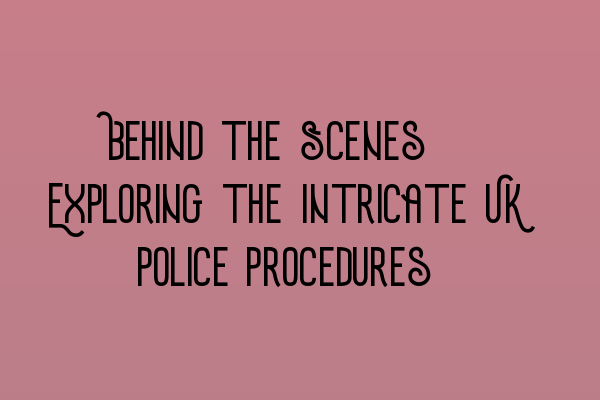Behind the Scenes: Exploring the Intricate UK Police Procedures
When it comes to understanding the criminal justice system, one cannot overlook the crucial role played by the UK police. In this blog post, we’ll delve deep into the intricate UK police procedures, giving you an insider’s perspective on what goes on behind the scenes.
The Investigation Process
The investigation process forms the foundation of any criminal case. From the moment a crime is reported, the police kick-start their work to gather evidence, identify suspects, and build a strong case. They follow a systematic approach, adhering to established protocols and guidelines.
When a crime is reported, the first step is to secure the crime scene. This ensures that crucial evidence is preserved and prevents contamination. Forensic experts are often called in to collect fingerprints, DNA samples, and other forensic evidence that can help crack the case.
Once the initial processing of the crime scene is complete, the police start their inquiries. This involves interviewing witnesses, gathering statements, and conducting background checks on potential suspects. They employ various techniques, such as surveillance, to collect as much evidence as possible.
Throughout the investigation, the police maintain detailed records, ensuring transparency and accountability. These records are essential for documenting every step taken, aiding the prosecution process. They also collaborate with other agencies and departments, exchanging information to strengthen their case.
Arrest and Detention
When the police have gathered sufficient evidence and identified a suspect, they proceed with making an arrest. It’s important to note that the police can only arrest an individual if they have reasonable grounds to believe that they have committed or are about to commit an offense.
After an arrest, the suspect is taken into police custody, where they undergo a series of processes. The police inform them of their rights and the reason for their arrest. They conduct an interview, known as the custody record, to gather further evidence and statements.
Depending on the severity of the alleged offense, the police can detain a suspect for different periods. They must adhere to strict guidelines and regulations to ensure the suspect’s welfare and rights are protected during their time in custody. Legal representatives are allowed to be present during interviews to assist the suspect.
Charging and Court Proceedings
Once the investigation is complete and the police have built a strong case, they consult with the Crown Prosecution Service (CPS) to determine whether charges should be brought against the suspect. If the CPS decides to proceed, the suspect is officially charged and notified of the offenses they are accused of.
Following the charging decision, the case moves to court proceedings. The police are responsible for preparing the case file, which includes all the evidence gathered during the investigation. This file is submitted to the CPS, who then presents the case in court.
In court, the police officers who were involved in the investigation may be called as witnesses. They provide testimony, presenting the evidence they collected and explaining the procedures followed. Their role is crucial in establishing the credibility of the evidence and strengthening the case against the defendant.
Conclusion
Understanding the intricate UK police procedures is essential for anyone interested in criminal law and practice. From the initial investigation to the court proceedings, the police play a vital role in ensuring justice is served.
If you’re looking to enhance your knowledge in criminal law and prepare for the SQE exams, check out our related articles:
- SQE 1 Practice Exam Questions
- SQE 1 Practice Mocks FLK1 FLK2
- SQE 2 Preparation Courses
- SQE 1 Preparation Courses
- SRA SQE Exam Dates
These resources will provide you with invaluable insights and help you excel in your studies. Stay tuned for more informative blog posts!
